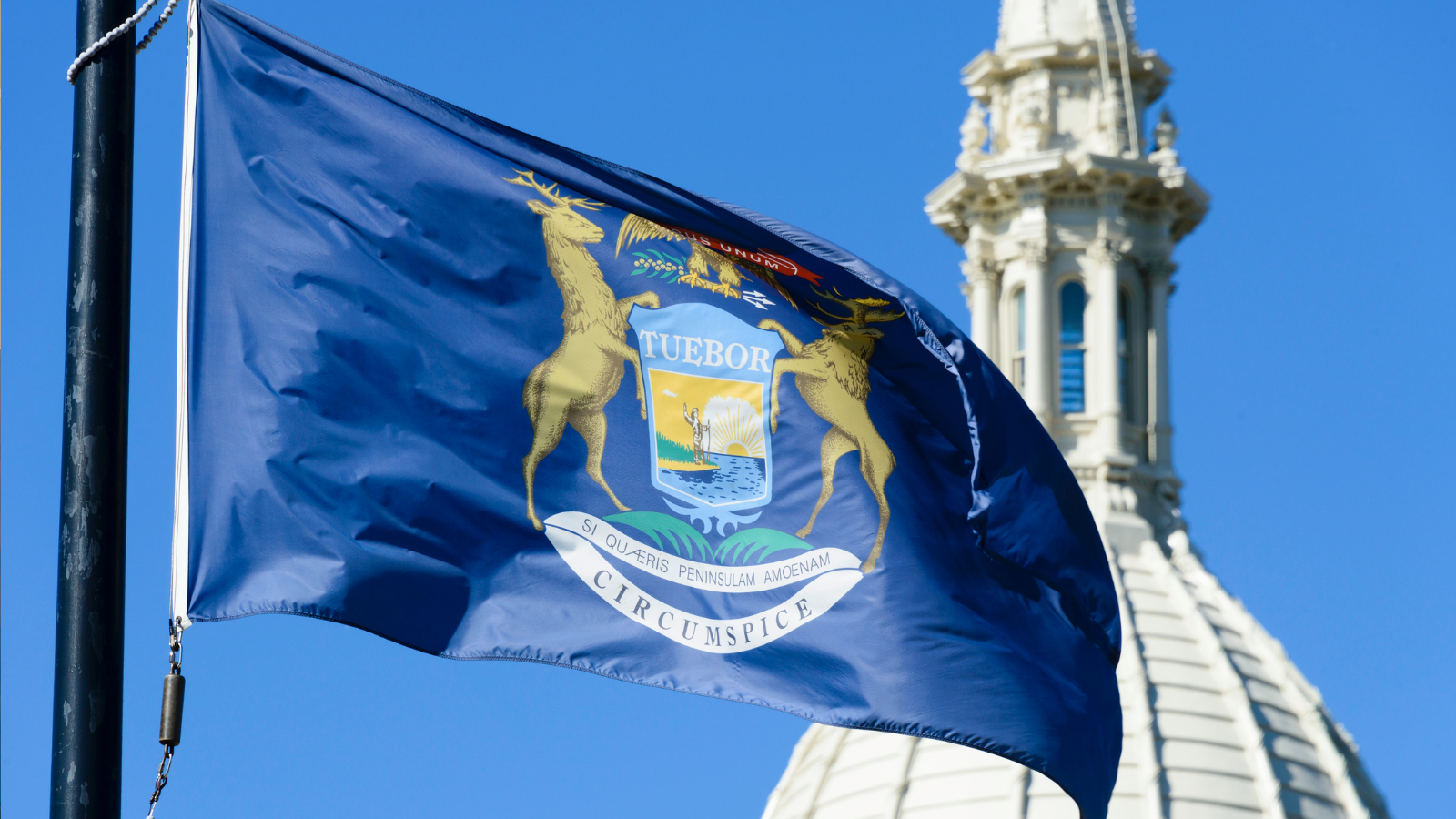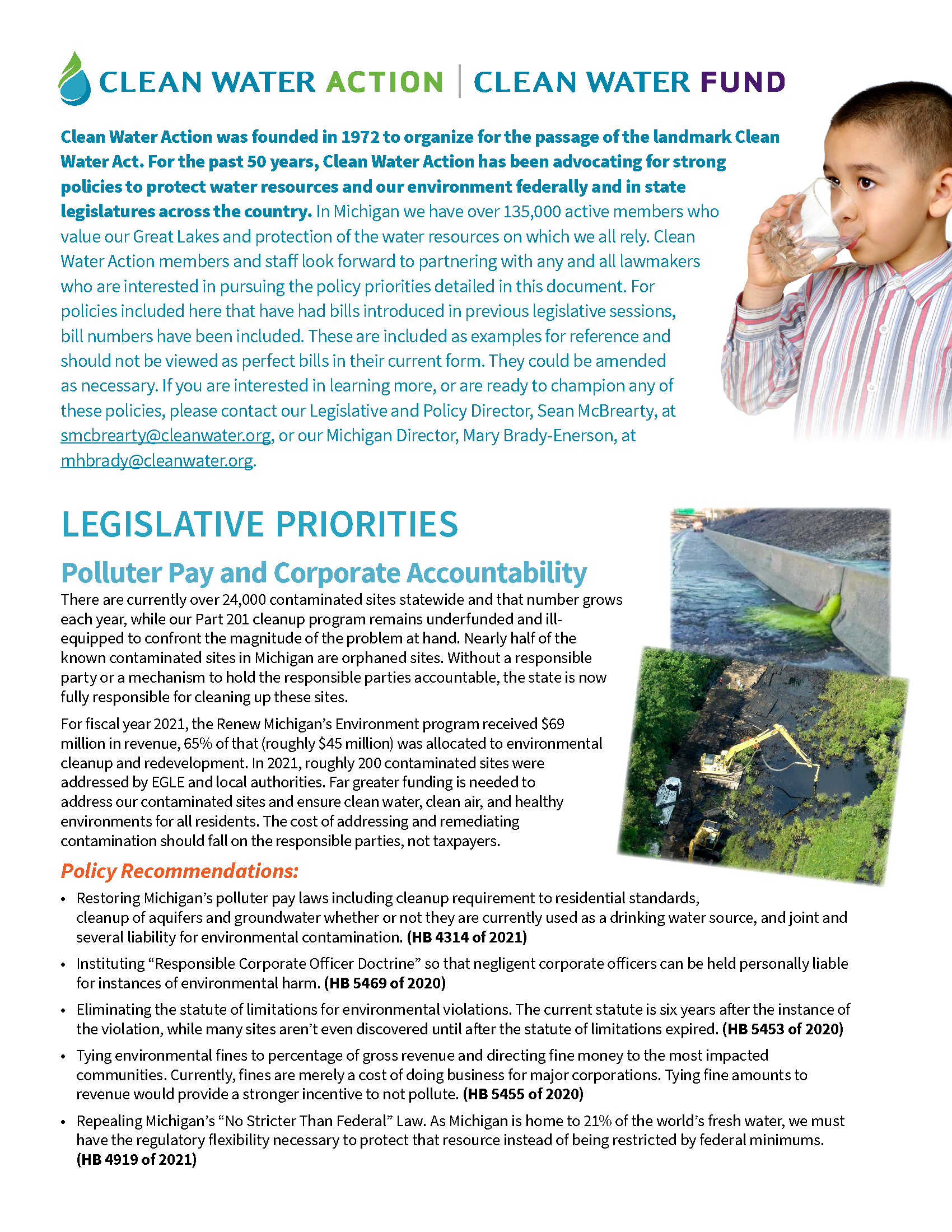
Clean Water Action was founded in 1972 to organize for the passage of the landmark Clean Water Act. For the past 50 years, Clean Water Action has been advocating for strong policies to protect water resources and our environment federally and in state legislatures across the country. In Michigan we have over 135,000 active members who value our Great Lakes and protection of the water resources on which we all rely.
Clean Water Action members and staff look forward to partnering with any and all lawmakers who are interested in pursuing the policy priorities detailed in this document.
For policies included here that have had bills introduced in previous legislative sessions, bill numbers have been included. These are included as examples for reference and should not be viewed as perfect bills in their current form. They could be amended as necessary.
If you are interested in learning more, or are ready to champion any of these policies, please contact our Michigan State Director Sean McBrearty.
Take Action: Contact Your Lawmakers On Current Michigan Priority Legislation
2023 Michigan Legislative Priorities
Polluter Pay and Corporate Accountability
There are currently over 24,000 contaminated sites statewide and that number grows each year, while our Part 201 cleanup program remains underfunded and ill-equipped to confront the magnitude of the problem at hand. Nearly half of the known contaminated sites in Michigan are orphaned sites. Without a responsible party or a mechanism to hold the responsible parties accountable, the state is now fully responsible for cleaning up these sites.
For fiscal year 2021, the Renew Michigan’s Environment program received $69 million in revenue, 65% of that (roughly $45 million) was allocated to environmental cleanup and redevelopment. In 2021, roughly 200 contaminated sites were addressed by EGLE and local authorities. Far greater funding is needed to
address our contaminated sites and ensure clean water, clean air, and healthy environments for all residents. The cost of addressing and remediating contamination should fall on the responsible parties, not taxpayers.
Policy Recommendations:
- Restoring Michigan’s polluter pay laws including cleanup requirement to residential standards, cleanup of aquifers and groundwater whether or not they are currently used as a drinking water source, and joint and several liability for environmental contamination. (HB 4314 of 2021)
- Instituting “Responsible Corporate Officer Doctrine” so that negligent corporate officers can be held personally liable for instances of environmental harm. (HB 5469 of 2020)
- Eliminating the statute of limitations for environmental violations. The current statute is six years after the instance of the violation, while many sites aren’t even discovered until after the statute of limitations expired. (HB 5453 of 2020)
- Tying environmental fines to percentage of gross revenue and directing fine money to the most impacted communities. Currently, fines are merely a cost of doing business for major corporations. Tying fine amounts to revenue would provide a stronger incentive to not pollute. (HB 5455 of 2020)
- Repealing Michigan’s “No Stricter Than Federal” Law. As Michigan is home to 21% of the world’s fresh water, we must have the regulatory flexibility necessary to protect that resource instead of being restricted by federal minimums. (HB 4919 of 2021)
Water Infrastructure and Investments to Address Water Contamination
Michigan’s water infrastructure is outdated, poorly rated, and significantly under-funded. While a recent influx of federal funding gives Michigan the chance to make a downpayment on our overall water infrastructure needs, sustainable long-term funding is required to fully address the problem. Conservative estimates claim that we have a funding shortfall for drinking, storm, and wastewater infrastructure of roughly $1 billion annually. Further, PFAS chemicals and other emerging contaminants continue to pollute drinking water sources for both residents who rely on private wells and residents who are hooked into water utilities.
The good news is that by creating the revenue necessary to rebuild our water infrastructure and address contamination issues, Michigan can create thousands of good-paying jobs. A 2018 report from Blue-Green Alliance confirmed that investing $105 billion in water infrastructure upgrades over 10 years nationally would result in the creation of 654,000 job-years across the US economy. Michigan has more lead service lines in use than any other state, and our drinking and stormwater infrastructure were rated “D” and “D-” respectively by the most recent American Society of Civil Engineers report card.
Rebuilding our water infrastructure is a responsible and necessary investment and Michigan policymakers must move as quickly as possible to provide the long-term funding that is needed to address our water infrastructure problems. There are many options that can be pursued at the state level to fund water infrastructure investments and address ongoing water contamination problems at the source.
Policy Recommendations:
- Identifying equitable funding mechanisms to address current shortfalls and fund replacement of outdated and failing infrastructure.
- Requiring all products that contain PFAS chemicals to be labeled as such. (SB 217 of 2021)
- Banning the use of PFAS chemicals in food packaging. (SB 591 of 2021)
- Increase funding to the SAW grant program which provides matching funds to municipalities for stormwater, asset management, and wastewater projects and programs, and eliminate match requirements for overburdened municipalities.
- Create a statewide sanitary code requiring regular inspections of septic systems at least every ten years.
- Allow municipalities to create stormwater utilities and incentivize green infrastructure updates. (SB 593 of 2021)
Addressing Environmental Racism and Injustice
The impacts of environmental contamination and climate change are felt strongest and most immediately by low income communities and communities of color. To address this long standing injustice, we must pursue policies that center environmental justice and will provide immediate relief to impacted communities and residents.
Communities that are the most impacted by industrial pollution, failing infrastructure, and climate change are often also at a disadvantage when it comes to obtaining funding to address these problems. Most lower-income municipalities lack staff that are capable of navigating complex state and federal grant processes. It is also more difficult for these communities to access bond funding, and relying on utility rate increases to fund infrastructure investments leads to less affordable water and power, and increased water and utility shut-offs. Investing in the environmental health, well-being, and economic recovery of these communities is not only the right thing to do, but is also the most prudent thing to do by directing our assets to communities that are the most in need.
Policy Recommendations:
- Directing funds from environmental fines to be spent in the communities that are most impacted by the specific violations that occurred. (SB 54 of 2021)
- Banning water shut offs for non-payment and incentivizing water affordability programs. (HB 4313 of 2021)
- Considering the cumulative impact to air and water quality of adjacent communities for all permits requested in a given zip code instead of considering impacts of each permit individually. (SB 109, 439 of 2021)
- Requiring EGLE and other state agencies to more fully incorporate public comment into their permitting decisions.
- Establishing Michigan Public Service Commission oversight of water utilities and rates.
- Adapting the Justice 40 initiative for Michigan, which would direct at least 40% of state climate and clean energy investments into disadvantaged communities.
Strengthening Public Trust Protections
Our water is a public resource. The State of Michigan is charged with the protection of our water resources for the public in perpetuity. Right now, statutory protections for our water have not caught up with science. We know that surface water and groundwater are connected as part of one hydrologic cycle, however surface water is explicitly protected in statute while the status of groundwater is vague and could be left to judicial interpretation.
As the global climate crisis continues to deepen, protection of the vast amount of surface and groundwater that defines our state must be a top priority. Water bottling companies should not
be permitted to take a public resource, bottle it, and sell it as if it were a product with no respect paid to the public’s ownership of that resource. Moreover, weak regulatory structures have made it very difficult for the state to reject water withdrawal permit requests, no matter how great the potential for damage to our public resources. Strengthening public trust protections in statute would help to ensure that our water remains a public resource owned by the people of Michigan, not a commodity subject to international trade agreements and available only to the highest bidder.
Policy Recommendations:
- Amending the Natural Resources and Environmental Protection Act to eliminate the “water bottling loophole”. (HB 5954 of 2022)
- Including groundwater specifically as a public resource in statute and charging appropriate state authorities with specific oversight of public trust water resources. (HB 5953 and HB 5955 of 2022)
- Implementing a licensing system for water bottlers that is more restrictive than the water withdrawal assessment tool, and requiring royalties paid by water bottlers go into a segregated fund that does not revert to the state general fund and can be spent only on water infrastructure, contamination, and affordability programs.
- Eliminating statutory deadlines for water withdrawal permit consideration.
Real Solutions to the Climate Crisis
The global climate crisis is one of the defining issues of our time. If we act boldly, we can create thousands of good-paying jobs, transform our energy and water infrastructure, and prepare Michigan to become a leader in the emerging green economy. If we fail to act now, the consequences of inaction will be felt for generations to come.
Governor Whitmer’s MI Healthy Climate Plan is a step in the right direction and the goals of the plan must be implemented through partnerships at all levels of government. While the MI Healthy Climate Plan is a good step, more aggressive action will be needed to achieve the global imperative of limiting anthropogenic climate change to less than 2 °C, and Michigan is poised to lead the way in that effort.
Michigan’s manufacturing infrastructure gives us a great opportunity to create thousands of jobs, attract new companies, and become a national leader in green energy, electric vehicle manufacturing, and green infrastructure innovation. However, regulatory changes are necessary to enable a just transition at the necessary speed.
Policy Recommendations:
- Increasing Michigan’s Renewable Portfolio Standard to 100% no later than 2035, and our Energy Efficiency Standard to at least 50% by 2030.
- Achieving statewide zero carbon emissions by 2040 or earlier.
- Assisting with home weatherization for lower income families by increasing funding to the Weatherization Assistance Program (WAP) to cover home repairs necessary to meet WAP minimum criteria and end deferrals.
- Eliminating caps on distributed renewable energy generation. (HB 4236 of 2021)
- Promoting electric vehicle use and production by creating a statewide charging station network, reducing EV registration fees, and offering larger tax credits for EV purchase.
- Banning the transport of oil and gas on, under, or through the Great Lakes.
Democracy and Money in Politics
At the federal and state level, our democracy has been under attack. From the corrosive influence of corporate money on our political system to the negative impact of term limits and the “revolving door” in Lansing, reforms are necessary to ensure transparency and accountability and restore trust between our government and the people it means to serve.
Trust in government has declined across the country over the last several decades, while corporations and wealthy individuals have gained and exerted greater control over the functions of our institutions. This lack of trust and corporate domination has resulted in greater polarization and an inability of our government to properly function, especially in regards to protecting the natural resources on which we all rely and responsibly addressing the global climate crisis. Reforming our institutions to increase accountability and transparency will help restore faith in the idea of government of, by, and for the people, and will enable lawmakers to more fully represent their constituents.
Policy Recommendations:
- Establishing a Legislative Open Records Act, and extending the Freedom of Information Act to include the Executive Office of Governor.
- Instituting a “cooling off period” requiring state lawmakers and department heads to refrain from registering as lobbyists for a minimum of five years after leaving office.
- Reducing campaign contribution limits and establishing PAC and super PAC contribution limits.
- Establishing donor disclosure requirements for PACs and super PACs to limit dark money in Michigan elections.
Revenue Reform
Michigan was once a national leader in supporting public services, but over the past 50 years, we have fallen behind other states, while asking more of working families and less of the wealthy corporations. As our public services have shrunk, so too have opportunity and prosperity for many Michiganders.
From 2000 to 2020, the Michigan general fund remained below $11 billion annually. If the general fund had even just kept up with inflation, we would have an additional $5 billion annually to spend on water infrastructure, schools, roads, and other priorities. While the influx of federal funding coming out of the COVID 19 pandemic has helped, long-term sustainable funding is needed to ensure that Michigan can meet the challenges of the 21st century. For example, our annual water infrastructure needs are estimated to be roughly $1 billion annually over the next twenty years.
While several important solutions to our long-term sustainable funding problem, such as adopting a graduated income tax, would require amending the state constitution via ballot initiative, there are measures to begin addressing this problem that could be pursued through legislation.
Policy Recommendations:
- Reforming and increasing the Corporate Income Tax to ensure that corporations are paying their fair share of taxes.
- Opposing irresponsible corporate tax giveaways and removing current loopholes that allow corporations to avoid paying their fair share.
- Championing a state constitutional amendment to eliminate flat tax requirements, paving the way for the creation of a graduated income tax.
- Opposing efforts to cut or rollback Michigan’s income tax rate.
- Repealing triggered income tax rate reduction which was implemented as part of the 2015 road funding plan.


